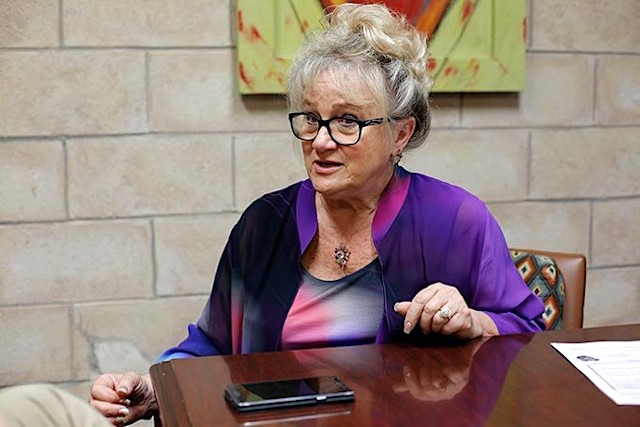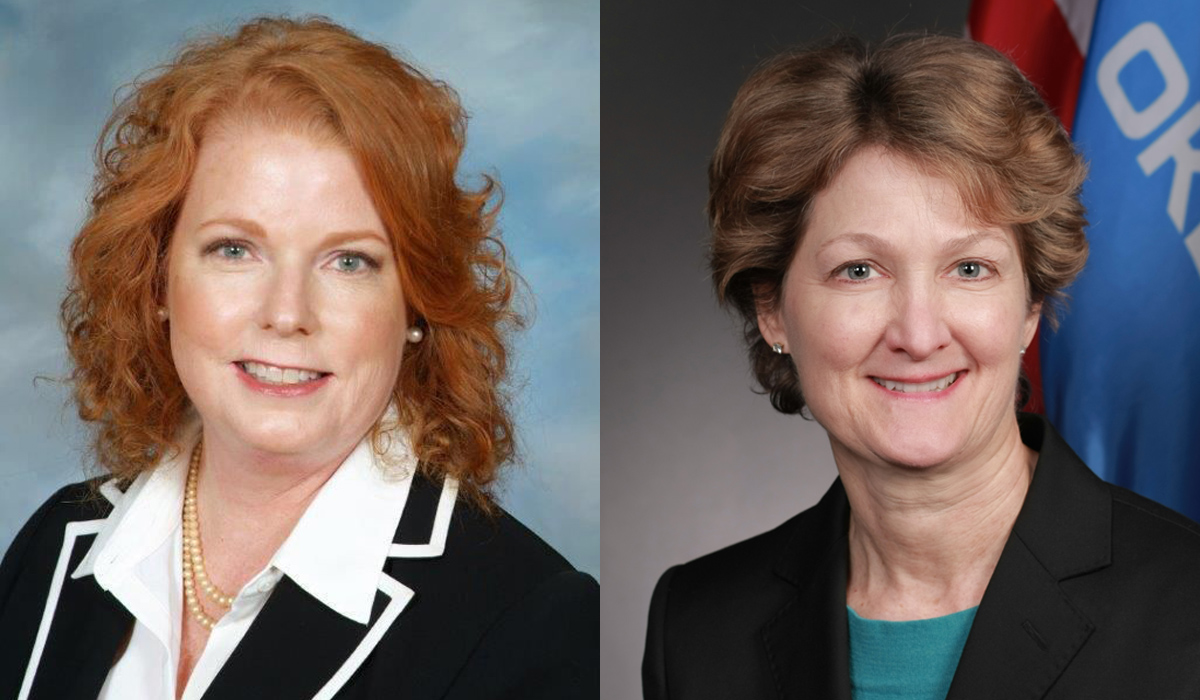

Two years after it began, a state audit of the shuttered Seeworth Academy charter school has revealed more than $250,000 in “misappropriated” expenditures by the school’s longtime superintendent, Janet Grigg, and has raised further questions about why board members, including Oklahoma Court of Civil Appeals Judge Barbara Swinton and Senate Minority Leader Kay Floyd, “failed to recognize and/or act on instances of suggested financial improprieties brought to their attention during the past decade.”
Originally requested by the Oklahoma State Department of Education, the audit report will be delivered to OSDE, Attorney General John O’Connor and Oklahoma County District Attorney David Prater, according to State Auditor and Inspector Cindy Byrd.
Prater told NonDoc today that he is launching a criminal investigation into what happened at Seeworth Academy.
“The theft or the misappropriation of money that was intended to benefit our state’s children is a serious matter to me,” Prater said. “I am initiating a criminal investigation of the conduct alleged in the auditor’s report.”
The Seeworth audit (embedded below) states that Grigg “misappropriated” more than $41,000 from the charter school’s corporate account. Auditors wrote that “although the corporate account was established with the school’s tax identification number and the statements were mailed to the school’s address, it was never included in the annual audited financial statements” and “it was managed outside the purview of board oversight” despite the board’s knowledge of its existence.
“The fraud consisted of improper ATM cash withdrawals, improper debit card purchases, and improper checks,” state auditors wrote. “Almost $10,000 was spent with QVC, HSN, and Evine, online retailers. Of the $4,500 in ATM withdrawals, over $2,200 was made at a local casino. Over $15,000 consisted of checks made out to Grigg or to cash. The remaining $11,500 were additional debit card transactions which included charges in cash withdrawals at Dillards, PayPal, Priceline, and various local convenience stores.”
State auditors wrote that board members — including longtime members Swinton, Floyd (D-OKC) and Lee Ann Wilson — had received recommendations from private auditors to institute financial controls at the school over the years. Board members had also heard allegations dating back at least to 2012 that Grigg was embezzling public and private funds from Seeworth and shredding financial documents, according to the state audit.
“Despite the fact that financial and internal control issues, along with red flags for potential fraud, were brought to the attention of the board, they failed to initiate follow-up procedures, increase oversight, or take other appropriate measures,” auditors wrote. “In March 2019, when the board received a whistleblower letter alleging financial improprieties, the allegations were dismissed. Soon after, when an individual offered to donate $1 million on the condition that an independent accounting firm conduct an audit of Seeworth, the donation was refused. (…) The overarching lack of oversight by the board created an environment ripe for financial mismanagement and the misappropriation of funds.”
Prater recently formed an Oklahoma County grand jury that has broad authority to examine matters of public corruption. It is possible Prater will use the grand jury to issue subpoenas or compel testimony under oath during his investigation into what happened at Seeworth Academy.
“If credible and admissible evidence of criminal conduct is identified, a charging decision will be made,” Prater said. “It is important to note that, at this point, all persons named in the auditor’s report are presumed innocent of criminal conduct.”
State Auditor and Inspector Cindy Byrd said “the criminality” of the Seeworth situation “cannot be ignored.”
“Ms. Grigg acted with sole authority as the superintendent, chief financial officer, and human resources director,” Byrd said in a statement. “The result is an incredible disservice to our taxpayers and the students. School choice is important for students in Oklahoma and should be protected. However, the criminality of this cannot be ignored.”
State Superintendent of Public Instruction Joy Hofmeister called the Seeworth audit “devastating” and described the Seeworth board as “less than fully engaged.”
“We thank Auditor Byrd for her diligent work initiated at our request. This is yet another example where parents, students and Oklahoma taxpayers are failed by a less-than-fully-engaged school board and loose state laws regarding charter schools,” Hofmeister said in a statement. “A lack of structure and accountability in state law has allowed for this apparent fraud. Charter school boards aren’t even currently required to undergo training for their fiduciary roles. We continue to call for the legislature to strengthen oversight of charters.”
The Seeworth audit comes about 13 months after Byrd released an audit of Epic Charter Schools and its controversial private management company, Epic Youth Services, which remains under criminal investigation. The Epic audit spurred calls for state-level reform of charter school oversight, which could be on the table for the 2022 legislative session.
Funds used for mortgage payment, Christmas presents for board

Formed in 1998 and established as a charter school in 2000, the Justice Alma Wilson Seeworth Academy was founded by the state’s first female Supreme Court Justice to serve at-risk students impacted by the criminal justice system. Swinton, Floyd and Lee Anne Wilson — the Supreme Court justice’s daughter — served on the board for more than a decade. Swinton, who was appointed to the Oklahoma Court of Civil Appeals in 2016, had served as chairwoman in recent years covered by the state audit.
The audit released today only examined the school’s finances and governance from July 1, 2017, through Dec. 31, 2019, six months after the board relinquished its charter with Oklahoma City Public Schools and shut down. Board members during that period included Swinton, Floyd, Wilson, Patricia Kelley, John Mayfield, Beverly Patchell and Greg Dewey.
Auditors outlined a myriad of financial issues regarding the school, its board and Grigg, including her receipt of numerous unauthorized bonus payments, an $8,353.54 payment on a personal home mortgage and her use of a 2007 GMC Yukon repossessed by OKCPS months after the school had closed and Seeworth’s car insurance policy had lapsed.
Auditors also chronicled Swinton’s dismissal of a “whistleblower” letter sent to her by school employee Shari Rodgers regarding Grigg in March 2019 and the subsequent removal of board member Greg Dewey in April 2019 after he asked questions about the letter and other reported financial concerns.
Among Dewey’s concerns stood Swinton’s and Wilson’s rejection of a proposed $1 million donation to Seeworth Academy by Paycom CEO Chad Richison, which was contingent on Richison seeing — and potentially paying for — an audit of the school’s financial accounts.
“The board, on the advice of board members Swinton and Wilson, who had met with Richison, turned down Richison’s offer. Swinton and Wilson stated the Richison offer was turned down because they felt he would exert too much influence over the school and they did not wish to comply with his audit request,” auditors wrote. “Greg Dewey was removed from the board on April 22, 2019. According to Swinton and Wilson, Dewey was removed because the board felt he was sharing confidential information with Richison. Based on emails received, Dewey was actively questioning school financial activities based on the whistleblower letter addressed to Swinton dated March 4, 2019.”
In responding to the whistleblower letter from Rodgers, Swinton wrote to Rodgers on March 10, 2019: “Thank you for your concerns about the financial health of Seeworth. These concerns were addressed by our board with our accountants and you should not have any concerns of the funds are being mishandled.”
Dewey told NonDoc in September 2019 that when he walked in the door for a special board meeting on April 22 he heard the end of a motion and vote to remove him from the board.
“I was read a bylaw out of our bylaws that said that I could be removed if I no longer had the students’ best interest at heart,” Dewey recalled. “I thought I did have that, but that was the only reason offered up.”
Floyd said in September 2019 that she had not attended the April meeting and did not remember the circumstances of Dewey’s departure. Swinton said “allegations were made that confidential information had been disclosed.”
“Because we had had another prior board member [who revealed private information], we believed that it was in the best interest of the board to move quickly and avoid any further disruption from the board standpoint,” Swinton said at the time.
Meanwhile, during the spring of 2019, Oklahoma City Public Schools Superintendent Sean McDaniel had become concerned about financial issues at Seeworth, including an Oklahoma State Department of Education letter that had found the charter school “seriously deficient in the areas of transparency, accountability and policies and procedures as they related to the school’s federal funds.”
McDaniel contacted the Oklahoma City Police Department to report allegations regarding Grigg’s use of school funds. Swinton eventually spoke to OKCPD investigators, who completed a police report on the matter in September 2019, hours after NonDoc had requested any relevant reports.
The state audit released today also noted that Seeworth incurred late fees on credit card payments and that cash payment received by the school for basketball ticket sales, concessions, cafeteria operations and the sale of Seeworth attire were mostly kept out of the school’s official accounting.
“Evidence suggests that a significant quantity of receipt books was lost or destroyed,” auditors wrote.
State auditors also identified $3,167 in school funds reimbursed to Grigg “for the purchase of Christmas presents for board members and school staff.” The presents included 18 Kindle Fire tablets purchased from QVC.
‘Cash receipts were allegedly destroyed in violation of law’

The new Seeworth audit also found that “cash receipts were allegedly destroyed in violation of law” and that “the board authorized $135,713.98 in improper expenditures after June 30, 2019, the day to see where the charter was officially relinquished.”
“Cash receipts were extremely limited. According to one former principal, Grigg asked him to shred receipt books but he declined. In response, Grigg allegedly rented a commercial shredder and had documents destroyed,” state auditors wrote. “This principal represented that he delivered receipt books from 2016 forward, in a leather case, to Grigg’s office at Seeworth north during the 2019 school year. Neither the case nor the records were located. Some scattered cash receipt records were found and only one two-part receipt book was located. This allegation is supported by a check for $600 payable to Absolute Data Shredding.”
The 2019 allegation was not the first time Seeworth board members had heard allegations of Grigg shredding documents. In 2012, former Seeworth principal Mongo Allen filed a federal discrimination lawsuit against the school and its board. In the suit, Allen said Grigg may have been “using Seeworth’s federal funds for personal use.” He alleged that Grigg had asked him “to shred receipt books used for recording the sale of t-shirts and concessions for Seeworth” in 2009.
Allen, who is Black, also alleged that Grigg, who is white, had treated minority employees differently than white employees. Allen said he detailed his concerns to a consultant hired by the Seeworth board and also attempted to speak with board members directly on multiple occasions. Ultimately, Allen said he was told by Grigg that his contract had not been renewed, according to court documents.
Allen’s lawsuit was settled, and Swinton told NonDoc in September 2019 that it would be inappropriate to discuss the matter after the fact. Also in September 2019, Floyd said she did not remember the specifics of Allen’s lawsuit and did not recall allegations related to document shredding or misuse of funds.
“I never heard that,” Floyd said. “That would have stuck out in my mind. I would tell you that any action with employees, we had a policy handbook. Our policy was set forth, and when something was brought to the board, we followed the policies set forth in our handbook.”
The new Seeworth audit calls the accuracy of that statement into question. Two years before Allen filed his 2012 lawsuit, board members were presented a private “audit report findings and management letter” for the fiscal year ending June 30, 2009. The private audit report outlined seven areas of “internal control weakness,” including:
1. The governing board approved the director as the representative for hiring of all staff members and negotiations of salaries. This action illuminates an oversight function, which can be a beneficial control in the payroll process.
2. The academy employs the individual who designed and owns the accounting software the academy is using to support their accounting records and provide their accounting reports. This individual has total control over the accounting system and performs payroll and expenditure functions for the academy.
3. The school does not have an adequate segregation of duties to ensure that duties assigned to individuals are done so in a manner that would not allow one individual to control both recording functions and procedures relative to processing a transaction.
The state audit noted that the 2009 private audit included “findings of violations of policy, procedures, or law,” including:
• The absence of payroll policies and procedures resulted in payments made to employees not supported by contracts or payments made in excess of the contract existed.
• Two contracts, one for the academy director and the other for the accountant, were not ever provided. were unable to determine that these individuals were paid the correct amount.
• The director was given absolute authority for approval of all the academies purchase orders and expenditures.
• An amount of $8,353.54 was paid on [Grigg’s] behalf for a personal mortgage. This amount was not included in her IRS W-2 form.
Asked for comment regarding the state’s Seeworth audit, Swinton and Floyd said they wanted to review the report before making any comment. NonDoc requested that they relay the same request for statement to Wilson. Phone numbers previously obtained for Grigg no longer appear to be active.
Seeworth audit questions timing of payment to law firm
At times, Seeworth board members have been represented by attorneys with the Tulsa law firm Rosenstein Fist & Ringold. When NonDoc requested board correspondence, meeting agendas and meeting minutes in September 2019, Swinton and Floyd referred the matter to RF&R attorney Matt Cyran, who then referred the request to OKCPS, the school’s former charter sponsor.
While Seeworth Academy ceased to exist as of June 30, 2019, OKCPS took the Seeworth board to court in August 2019 after Seeworth officials refused to provide all property and funds to the district. A court order dated Sept. 4, 2019, finalized the agreement and transfer of assets.
But according to the state’s new Seeworth audit, board members sent a cashier’s check on Aug. 29, 2019, for more than $57,700 to Rosenstein Fist & Ringold with “cash withdrawn from the Seeworth general fund bank account.” While state auditors noted that some or all of that amount could have been transferred to pay for legal debts incurred prior to the school’s closure on June 30, attempts to verify the timing of the expenses were unsuccessful.
“Despite our efforts to obtain unredacted invoices and determine this amount, RF&R only provided partially redacted invoices for our review. Based on these invoices it was not possible to fully ascertain how much of the services billed by RF&R for pre-June 30 associated costs,” auditors wrote. “RF&R continued to apply invoices against the remaining balance of $44,753.99 through April 2020. At that time, the residual $4,144.09 was transferred to the law firm of White and Weddle PC.”
NonDoc asked Gov. Kevin Stitt’s office if the governor had any comment on the Seeworth audit. Secretary of Education Ryan Walters sent a statement referring to Seeworth’s “blatant disregard for law” but saying charter schools are “too often demonized” in Oklahoma.
“Accountability is foundational for the success of public education in Oklahoma. The instant the State Board of Education learned of the blatant disregard for law and process at Seeworth Academy, they moved swiftly with Gov. Stitt’s support to close the school and protect students,” Walters said. “Despite being some of our top performing institutions, Oklahoma charter schools, which are public schools, are too often demonized and receive little to no support from their authorizers.”
Review the full Seeworth audit
 Loading...
Loading...
(Editor’s note: This article was updated 25 minutes after it posted to clarify its headline. it was updated again at 6:25 p.m. to include a quote from Ryan Walters.)




















